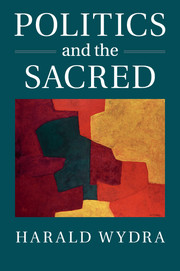Crossref Citations
This Book has been
cited by the following publications. This list is generated based on data provided by Crossref.
2015.
Religion and Politics in the European Union.
p.
197.
Boland, Tom
and
Griffin, Ray
2016.
Making sacrifices: how ungenerous gifts constitute jobseekers as scapegoats.
Distinktion: Journal of Social Theory,
Vol. 17,
Issue. 2,
p.
174.
Brighi, Elisabetta
2017.
The Palgrave Handbook of Mimetic Theory and Religion.
p.
395.
Farmanfarmaian, Roxane
2017.
Media and the politics of the sacral: freedom of expression in Tunisia after the Arab Uprisings.
Media, Culture & Society,
Vol. 39,
Issue. 7,
p.
1043.
Farneti, Roberto
2017.
Facts and Norms in Democratization.
Democratic Theory,
Vol. 4,
Issue. 2,
Greco, Monica
and
Stenner, Paul
2017.
From paradox to pattern shift: Conceptualising liminal hotspots and their affective dynamics.
Theory & Psychology,
Vol. 27,
Issue. 2,
p.
147.
Rusu, Mihai Stelian
2017.
Transitional Politics of Memory: Political Strategies of Managing the Past in Post-communist Romania.
Europe-Asia Studies,
Vol. 69,
Issue. 8,
p.
1257.
Roman, Camil Francisc
2018.
The revolutionary and Napoleonic wars in the Prussian political imaginary: a politico-anthropological genealogy of the ‘special’ German–French relations.
Journal of International Relations and Development,
Vol. 21,
Issue. 2,
p.
322.
Wydra, Harald
2018.
Generations of Memory: Elements of a Conceptual Framework.
Comparative Studies in Society and History,
Vol. 60,
Issue. 1,
p.
5.
Newheiser, David
2019.
Hope in a Secular Age.
Slothuus, Lukas
2021.
Faith between reason and affect: thinking with Antonio Gramsci.
Distinktion: Journal of Social Theory,
Vol. 22,
Issue. 3,
p.
340.
Vindrola-Padros, Cecilia
Vindrola-Padros, Bruno
and
Lee-Crossett, Kyle
2021.
Immobility and Medicine.
p.
1.
van der Tol, Mariëtta
2021.
The “Jew,” the Nation and Assimilation: The Old Testament and the Fashioning of the “Other” in German and Dutch Protestant Thought.
Journal of the Bible and its Reception,
Vol. 8,
Issue. 2,
p.
143.
Doja, Albert
2022.
Political Appeal of Religion.
Implicit Religion,
Vol. 24,
Issue. 1,
Kustermans, Jorg
Svensson, Ted
Costa López, Julia
Blasenheim, Tracey
and
Hoffmann, Alvina
2022.
Ritual and authority in world politics.
Cambridge Review of International Affairs,
Vol. 35,
Issue. 1,
p.
2.
Goldoni, Marco
2022.
The Materiality of the Legal Order.
van der Tol, Marietta
and
Gorski, Philip
2022.
Secularisation as the fragmentation of the sacred and of sacred space.
Religion, State and Society,
Vol. 50,
Issue. 5,
p.
495.
Jones, Ali
2024.
Squatted Sacred Spaces: A Left-Radical Political Theology of Hamburg’s Rote Flora.
Political Theology,
Vol. 25,
Issue. 4,
p.
380.
Forlenza, Rosario
and
Thomassen, Bjørn
2024.
Christian democracy as political spirituality: transcendence as transformation—Italian politics, 1942–1953.
Politics and Religion,
p.
1.





